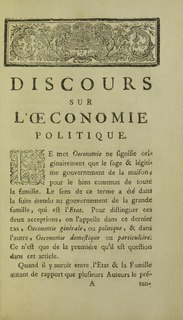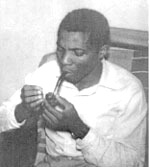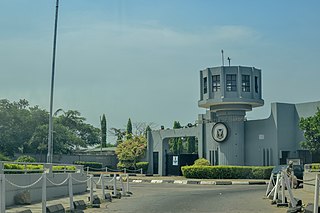Related Research Articles

Economics is "the social science that studies the production, distribution, and consumption of goods and services."

Political economy is the study of production and trade and their relations with law, custom and government; and with the distribution of national income and wealth. As a discipline, political economy originated in moral philosophy, in the 18th century, to explore the administration of states' wealth, with "political" signifying the Greek word polity and "economy" signifying the Greek word οἰκονομία. The earliest works of political economy are usually attributed to the British scholars Adam Smith, Thomas Malthus, and David Ricardo, although they were preceded by the work of the French physiocrats, such as François Quesnay (1694–1774) and Anne-Robert-Jacques Turgot (1727–1781). There is also a tradition which is almost as long, of critique of political economy.

Nnamdi Benjamin Azikiwe, PC, usually referred to as "Zik", was a Nigerian statesman and political leader who served as the first President of Nigeria from 1963 to 1966. Considered a driving force behind the nation's independence, he came to be known as the "father of Nigerian Nationalism".

Christopher Ifekandu Okigbo was a Nigerian poet, teacher, and librarian, who died fighting for the independence of Biafra. He is today widely acknowledged as an outstanding postcolonial English-language African poet and one of the major modernist writers of the 20th century.

Anambra State is a Nigerian state, located in the southeastern region of the country. According to the 2006 census report there are over 4.1 million residents in the state. The state name was formed in 1976 from the former East Central State, the state is named after Omambala River, a river that runs through the state. Anambra is the anglicised version the British Colonialists used to refer to the Omambala. The state capital is Awka, a rapidly growing city that increased in population from approximately 300,000 to 2.5 million between 2006 and 2018. The city of Onitsha, a historic port city from the pre-colonial era, remains an important centre of commerce within the state.
The Eastern Region was an administrative region in Nigeria, dating back originally from the division of the colony Southern Nigeria in 1954. Its first capital was Calabar. The capital was later moved to Enugu and the second capital was Umuahia. The region was officially divided in 1967 into three new states, the East-Central State, South-Eastern State. East-Central State had its capital at Enugu, which is now part of Enugu State.

The University of Ibadan (UI) is a public research university in Ibadan, Nigeria. The university was founded in 1948 as University College Ibadan, one of many colleges within the University of London. It became an independent university in 1962 and is the oldest degree-awarding institution in Nigeria. Through its graduate network, the University of Ibadan has contributed to the political, industrial, economic and cultural development of Nigeria. The history and influence of the University of Ibadan have made it one of the most prestigious universities in Africa.
Oyinbo is a Yoruba-Nigerian word used to refer to the early Caucasians. In the early 1470s when the first Portuguese berth in Eko, presently Lagos. Oyinbo is generally used to refer to a person of European descent, African people perceived to not be culturally Sub-Saharan Africans, or nowadays every other people of any race considered light-skinned. The word is generally understood by most Nigerians and many Africans.
Michael Joseph Chukwudalu Echeruo is a Nigerian academic, professor and literary critic from Umunumo, Ehime-Mbano LGA, Imo State. He is the William Safire Professor of Modern Letters in the English Department at Syracuse University since 1990.

Etche is one of the 23 Local Government Areas of Rivers State and amongst the 13 federal constituencies representing River State in Nigeria's National Assembly and part of the Rivers East Senatorial District.
Yaba Higher College was founded in 1932 in Yaba, now a suburb of Lagos in Nigeria to provide tertiary education to Africans, mostly in vocational subjects and teaching. The college staff were transferred to start the University of Ibadan in 1948 and the college premises were used for the new Yaba College of Technology.
Christ the King College, Onitsha (CKC), popularly known as CKC Onitsha, or Amaka Boys, is an all-boys secondary school in Onitsha, Nigeria. It is ranked the number 1 high school in Nigeria and 36th in the top 100 best high schools in Africa as of February 2014. It was founded on February 2, 1933, by the late Archbishop Charles Heerey, CSSp, and his fellow Irish missionaries. Bishop Heerey remained the proprietor of the school until his death in the spring of 1967. The chief mission of the school is to develop indigenous manpower and leadership skills from the vast pool of Nigerian youths and in a Roman Catholic tradition and environment. The first principal of the college was Rev Fr. Leo Brolly and the first student to be admitted into the college was Peter Charles Obi Nwagbogu
Emmanuel Arinze Ifeajuna was a Nigerian army major and high jumper. He was the first Black African to win a gold medal at an international sports event when he won at the 1954 British Empire and Commonwealth Games. His winning mark and personal best of 6 ft 8 in (2.03 m) was a games record and a British Empire record at the time.
Omu Okwei or Okwei of Osomari (1872–1943) was a Nigerian queen merchant from Osomari.

Mazi Mbonu Ojike was a Nigerian nationalist and writer. He advanced from a choirmaster, organist, and teacher in an Anglican school to become a student in America and then a cultural and economic nationalist. He was the Second Vice President NCNC and Deputy Mayor of Lagos in 1951. Ojike was known as the "boycott king" for his slogan, 'boycott the boycottables'. In America, he spent 8 years involved in intellectual pursuit and improving outsiders’ knowledge of Africa speaking from an African perspective. Upon his return, he promoted his brand of Africanisation, a persistent consumption of African forms of cloths, food, dress, religion and dances while also believing in the selective benefits of foreign amenities. Ojike made common the use of the word Mazi as a substitute for Mr.
Bolaji S. Ramos is a Nigerian poet, writer, analyst and researcher.
Osita M. Ogbu, OON is a professor of economics at the University of Nigeria. He was the Minister of National Planning from 2005 to 2006, and former Chief Economic Advisor to the President of Nigeria.
Kalu Idika Kalu is a Nigerian politician. He served as Finance Minister of Nigeria, Minister of National planning and Transportation Minister. He served twice as the minister of finance. He was a presidential aspirant in the 2003 Nigeria general elections, under the platform of The New Nigeria Peoples Party (NNPP).
Janet Okala (1894–1971) was a Nigerian political leader.

Obi Nwakanmma is a Nigerian poet, critic and academics in the University of Central Florida. He writes a regular Sunday column on Vanguard Newspaper called The Orbit. His works has also appeared on The Punch, ThisDay and TheCable.
References
- Pius Okigbo Citation, Nigerian Merit Award.
- ↑ Mbanefo, Arthur C I (8–9 June 2001). "Vision and Policy in Nigerian Economics: The Legacy of Pius Okigbo" (PDF). Part 1, Memoirs and Tributes. p. 3. Archived from the original (PDF) on 5 February 2014. Retrieved 18 February 2012.
Pius had laid a very good foundation for his higher education at Christ The King College, Onitsha where he had a most brilliant academic career
- 1 2 Chuku, Gloria (2013), Chuku, Gloria (ed.), "Pius Nwabufo Okigbo: A Pragmatic Economist and an Intellectual Giant", The Igbo Intellectual Tradition, Palgrave Macmillan US, pp. 193–222, doi:10.1057/9781137311290_8, ISBN 978-1-349-45691-8
- ↑ Chuku, Gloria (2013), Chuku, Gloria (ed.), "Pius Nwabufo Okigbo: A Pragmatic Economist and an Intellectual Giant", The Igbo Intellectual Tradition: Creative Conflict in African and African Diasporic Thought, Palgrave Macmillan US, pp. 193–222, doi:10.1057/9781137311290_8, ISBN 978-1-137-31129-0
- ↑ Okigbo, Pius (1962). "Nigerian National Accounts, 1950–7". Review of Income and Wealth. 1962 (1): 285–306. doi:10.1111/j.1475-4991.1963.tb01008.x. ISSN 1475-4991.
- ↑ Udo, Mary (2017-02-14). "OKIGBO, (Dr) Pius N.C". Biographical Legacy and Research Foundation. Retrieved 2020-05-04.
- ↑ "Nigeriaworld Letters & Viewpoints (Okigbo: Tribute to a legend)". nigeriaworld.com. Retrieved 2020-05-04.
- ↑ "Nigeria's No1 Economy and Financial Information Hub". Nigeria’s No1 Economy and Financial Information Hub. Retrieved 2020-05-04.